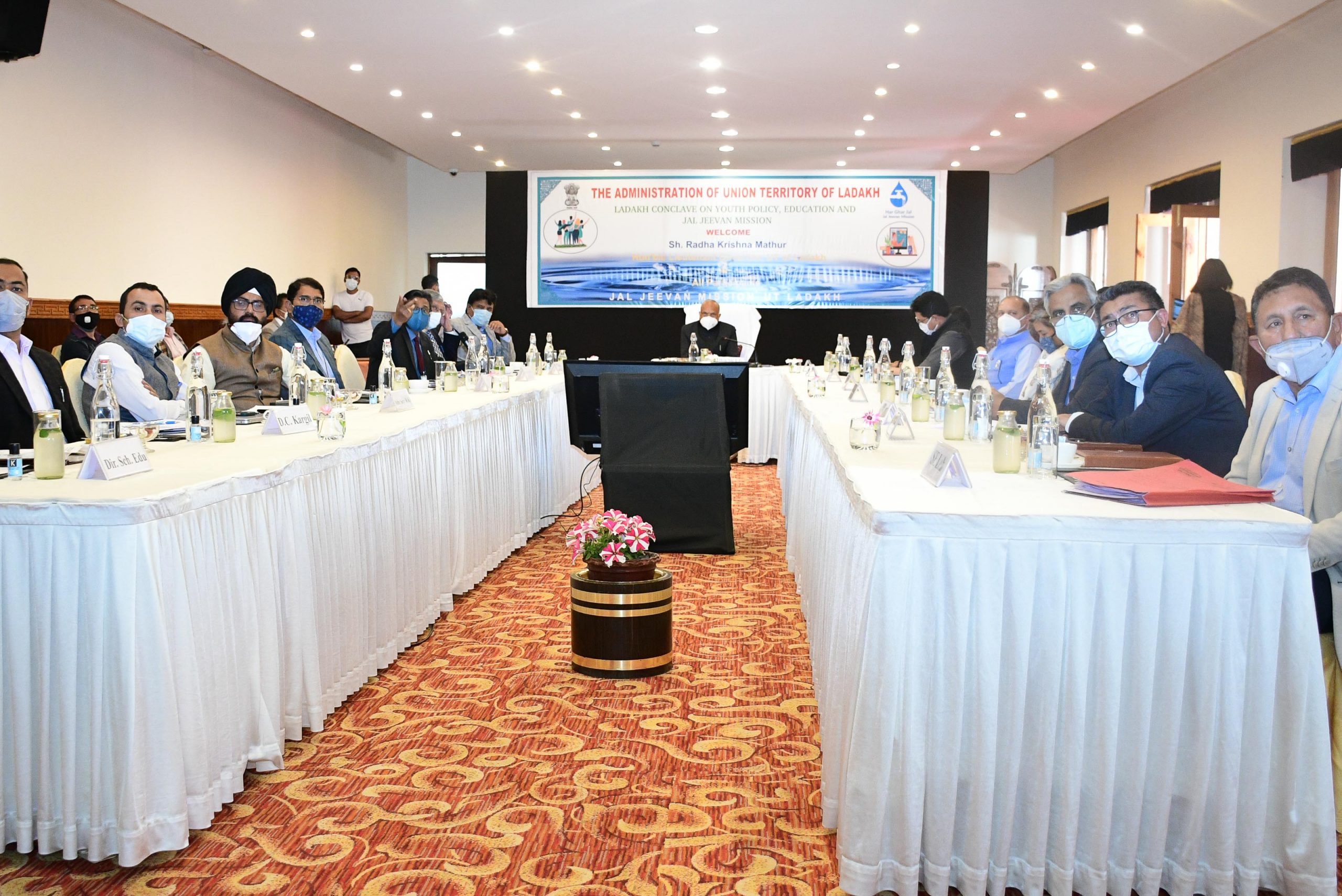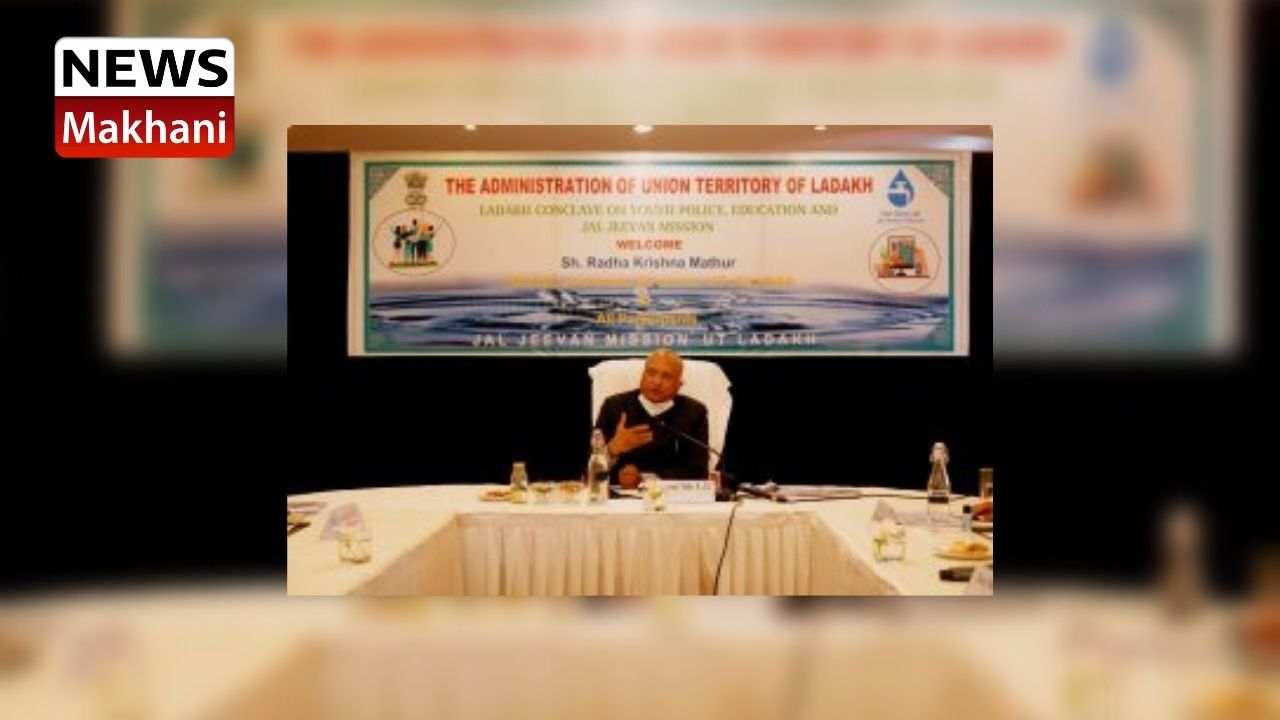Leh,01 July 2021 Lieutenant Governor, Ladakh, RK Mathur, chaired the second in series of the Ladakh Developmental Conclave to plan the way forward and to allocate responsibilities to the Administration and Councils in implementing the Jal Jeevan Mission, projects of the Education Department and the Ladakh Youth Policy.
Lt Governor RK Mathur termed Jal Jeevan Mission as a top priority project. He urged the Hill Councils and the Administration to play their part to accelerate the pace of providing tap connection to all the rural households to fulfil the commitment of achieving ‘Har Ghar Nal, Har Ghar Jal’ in UT Ladakh by 15th August 2022. Ladakh is one of the four states in the country to make this commitment.
LG Mathur stressed the need for a comprehensive approach and community involvement to accelerate the implementation of the scheme in UT Ladakh. He urged the Chairman of both the LAHDC to take personal interest in implementing this flagship scheme and monitor its implementation on a daily basis. He also impressed upon the Councils the need to adapt JJM according to the demands and requirements of the tough terrain, geography and climate of Ladakh. He exhorted the Councils to involve the community, PRIs and all stakeholders to ensure this.
Commissioner Secretary, Public Health Engineering Dept. Ajeet Kumar Sahu gave a detailed presentation on JJM discussing the national perspective, target and physical progress of functional household tap connection (FHTC) coverage, 100-day campaign, the financial progress, water quality & lab status, skill development plan, greywater management plan, Geo-tagging and Aadhar-tagging and observations and action points. Highlighting issues and the roadmap, Sahu added that the Councils are working hard for completing 100% DPRs and the allotment of work.
Discussing the implementation strategy of JJM, Chairman LAHDC Kargil, Feroz Khan, explained that the implementation of JJM in Kargil was a bit slow due to COVID-19 but he is expecting fast track implementation of the scheme in Kargil in the coming few months considering the high number of approvals of DPRs. While CEC Leh, Tashi Gyalson accepted the need to expedite administrative formalities for the timely completion of work keeping in mind the short working season in Ladakh. He highlighted the challenges in rural areas and difficulties in achieving the targeted timeline. It was pointed out that the Councils have the flexibility and authority in this matter that has repeatedly been informed to them.
Speaking about JJM, MP Ladakh shared that both the Councils and public representatives of Ladakh should be taken into confidence while implementing the JJM Scheme in Ladakh.
Terming JJM as an important programme, Advisor Umang Narula highlighted the assistance Ladakh received from the Govt of India for implementing the scheme in the newly formed Union Territory. Advisor Narula appreciated the department’s effort to complete and successfully running a pilot project of 24X7 water supply in Leh that remained functional throughout the last winter.
Terming JJM a flexible scheme, Additional Secretary & Mission Director, NJJM, Bharat Lal, assured to extend support from the Ministry. He expressed his hope to see the scheme completed in Ladakh within the stipulated time and set an example for other states and UTs. He also impressed the need to train the citizens for the long-term sustenance of the scheme. He appealed to the UT Administration to set up the laboratories at the earliest to provide clean drinking water to all.
Starting the discussion on the School Education Sector, Commissioner Secretary, AK Sahu, made a detailed presentation discussing the Vision 2050, rationalisation of schools, enrolment, dropouts and Out of School Children (OoSC), infrastructure, affiliation to the board, residential hostels, community radio, Padhna Likhna Abhiyan, budget allocation and achievements and the work in progress during the discussion on the education sector. Sahu shared the UT Administration’s Action Plan 2026 to keep schools and hostels functional throughout the year, the capacity-building and improvement in the quality of teachers. He also highlighted providing reliable internet connection and ICT labs with Smart class and career counselling in every HSS and HS, providing education for all sections of the society and their choice of hostel facility, achieving 100% adult literacy and awareness on carbon neutrality and providing early childhood care and education.
Sahu also spoke on the Performance Grading Index (PGI) and informed the concerned officials that the PGI scale has been computed for the first time in UT Ladakh. Informing the Education Department’s initiative to start an intensive teacher training programme, Sahu shared that Ladakh is the only union territory to achieve 100% training in NISHTHA and IMPACT.
For improvement in the School Education sector in Ladakh, Lt. Governor RK Mathur advised that Anganwari Centers must be co-located with primary schools as per the New Education Policy in a time-bound manner. He impressed upon the need for rationalisation of schools within a fixed timeframe, timely updating data for improving the Performance Grading Index and promoting the Ladakh-centric content and relevant languages in school textbooks. LG Mathur emphasised the need to maintain up-to-date statistics of all attributes affecting the quality of teachers, infrastructure and other facilities in schools across the Union Territory. He also directed to provide training to existing faculty for teaching differently-abled students. CEC, LAHDC Kargil, Feroz Khan, highlighted the issues about the affiliation of govt schools of UT Ladakh to CBSE. He informed the concerned officials of the current status of the active participation from the people of Kargil in conducting community classes. He suggested adopting Council Model schools and 100 per cent enrolment drives in all the govt. schools. While Chairman, LAHDC Leh, Tashi Gyalson, highlighted the need for attractive measures in Govt. schools to encourage enrolment drives. He also stressed the need to establish more residential schools, especially for students studying in remote areas of Ladakh. He highlighted the need to form a school-level management committee, in which concerned public representatives, including Councillors, could help monitor community-level regulations on the ground. He also spoke about the need for promoting and strengthening Council Model Schools. He gave examples of active participation from the villages of Spituk, Sakti and Phey.
Member of Parliament, Ladakh, Jamyang Tsering Namgyal, emphasised the need to include local-oriented content in the school books if the schools get affiliation from CBSE. He also highlighted the need for professional training for the teachers and staff. He suggested a standard literature/language for the entire UT Ladakh. He stated that the schools in UT Ladakh should be planned in a standard manner to meet the requirements of both school administration and students.
Advisor to HLG, Umang Narula, requested both the CECs to consider the issue of rationalisation on priority.
Administrative Secretary Ravinder Kumar gave a presentation and discussed the vision, data on employment and working population, unemployment, objectives and priority areas of Youth Policy 2021, proposals for youth engagement and related efforts in UT Ladakh, self-employment and entrepreneurship. He shared that the literacy rate in Ladakh is 74.2%, including 77.20% in Leh and 71.34% in Kargil, as per the 2011 census. Speaking about employment generation, Ravinder informed that the government job ratio Vis-à-vis in Ladakh is one of the highest in the country. He added that 23484 people have jobs in the organised sector in UT Ladakh, which is approximately one job per two households.
Secretary Ravinder informed that 56% of people are engaged in agriculture & allied sector, 4% in transport and communication, 13.4% in manufacturing, 9.4% in wholesale, retail and hotel, 3.7% in construction and 10% in other services. He shared that the unemployment rate in UT Ladakh as per the projected population and data available from the employment department about unemployed registered youth in 2021 is approximately 2.3%. He informed that 113 posts in Leh and 380 posts have been filled since the formation of the UT. Highlighting the objectives and priority areas of Draft Ladakh Youth Policy – 2021, Ravinder informed that UT Administration’s priority is to create a productive workforce.
Speaking on Ladakh Youth Policy, LG Mathur stated that it has been drafted on the lines of National Youth Policy 2020 and is tailored to suit the requirements of the Ladakhi society. He stated that the Ladakh Youth Policy is not a government job-generating policy but rather an approach towards skill development to bridge the gap between opportunities and unemployed youth.
LG Mathur also highlighted the need for certification of skills and exploring the opportunity of creating jobs through various activities in each department of Ladakh. He shared that the primary objective is to have a 100 per cent skilled society, a knowledge-based society. LG Mathur said that this is a fundamental requirement for the progress of Ladakh.
Sharing his views on the Ladakh Youth Policy, Feroz Ahmad Khan stated that the Ladakh youth usually focus on government jobs.
He stressed that this mentality needs to be changed with a collective effort to open them towards business and entrepreneurial sectors also. He added that the Industrial Training Institutes and Govt. Polytechnics need strengthening to nurture young talent in Ladakh. Similarly, Tashi Gyalson stressed the need to encourage youth, especially in rural areas, to engage in entrepreneurship. He also highlighted the need for more centres of skill development. He stressed the need for mental healthcare centres and drug rehabilitation centres in the UT looking at the surge in suicides and drug abuse cases. He also highlighted the need to provide incentives for sportspersons and strengthening sports infrastructure.
Earlier, Divisional Commissioner Saugat Biswas welcomed the participants. Dr Safdar Ali, Director, SED, gave the vote of thanks.
CEC, LAHDC Leh, Tashi Gyalson; CEC, LAHDC Kargil, Feroz Ahmad Khan; Member of Parliament, Ladakh, Jamyang Tsering Namgyal; Advisor Ladakh, Umang Narula; Additional Secretary & Mission Director NJJM, Bharat Lal; Principal Secretary, Dr Pawan Kotwal; Commissioner Secretary, Ajeet Kumar Sahu; Divisional Commissioner, Saugat Biswas; Secretary Law, Preet Pal Singh; Secretary, Padma Angmo; Secretary Tourism, Mehboob Ali Khan; Administrative Secretary, Ravinder Kumar; Deputy Commissioner, Kargil Santosh Sukhadeve, Director, SEL, Dr Safdar Ali, ADC, Sonam Chosjor; Chief Engineer, Fareed Ahmad Chaudhary and Superintendent Engineers of the department attended the conclave.
- HOME
- ਭਾਰਤ
- ਰਾਸ਼ਟਰੀ
- ਸਟੇਟ
- ਅੰਡੇਮਾਨ ਅਤੇ ਨਿਕੋਬਾਰ ਟਾਪੂ
- ਆਂਧਰਾ ਪ੍ਰਦੇਸ਼
- ਅਰੁਣਾਚਲ ਪ੍ਰਦੇਸ਼
- ਅਸਾਮ
- ਬਿਹਾਰ
- ਛੱਤੀਸਗੜ੍ਹ
- ਦਾਦਰਾ ਅਤੇ ਨਗਰ ਹਵੇਲੀ ਅਤੇ ਦਮਨ ਐਂਡ ਦਿਉ
- ਦਿੱਲੀ
- ਗੋਆ
- ਗੁਜਰਾਤ
- ਝਾਰਖੰਡ
- ਕਰਨਾਟਕ
- ਕੇਰਲਾ
- ਲੱਦਾਖ
- ਲਕਸ਼ਦਵੀਪ
- ਮੱਧ ਪ੍ਰਦੇਸ਼
- ਮਹਾਰਾਸ਼ਟਰ
- ਮਣੀਪੁਰ
- ਮੇਘਾਲਿਆ
- ਮਿਜ਼ੋਰਮ
- ਨਾਗਾਲੈਂਡ
- ਓਡੀਸ਼ਾ
- ਪੁਡੂਚੇਰੀ
- ਰਾਜਸਥਾਨ
- ਸਿੱਕਮ
- ਤਾਮਿਲਨਾਡੂ
- ਤੇਲੰਗਾਨਾ
- ਤ੍ਰਿਪੁਰਾ
- ਉੱਤਰ ਪ੍ਰਦੇਸ਼
- ਉਤਰਾਖੰਡ
- ਪੱਛਮੀ ਬੰਗਾਲ
- ਉੱਤਰੀ ਭਾਰਤ
- ਖੇਤੀ ਬਾੜੀ
- ਜੀਵਨਸ਼ੈਲੀ
- ਮਨੋਰੰਜਨ
- ਸਿੱਖਿਆ
- Language:

 English
English


